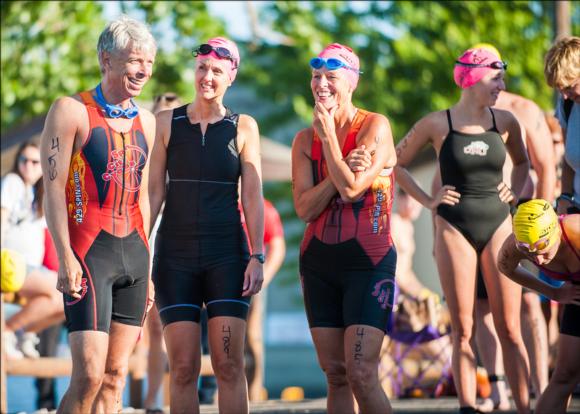Support groups can be the key to triathlon success
This is an excerpt from Train to Tri by Linda Cleveland,Kris Swarthout.
One of the keys to your success in training for and completing your first triathlon, besides putting in all the training time, is your support group. Your journey will be much easier if you find people who want to help you complete your first triathlon by offering moral support, providing childcare support, motivating you, being a workout buddy, or just cheering you along the way. These people can include your significant other, friends, family, kids, babysitters, coach, training groups, triathlon clubs, coworkers, online bloggers, and anyone else you enlist to help you successfully complete this journey.
Training Groups
Groups can be beneficial for the newer athlete. They can offer motivation, knowledge, and a fun sense of community. Many types of group training opportunities are available in the sport of triathlon, a direct benefit of being made up of three sports. We will touch on the major types of group training and address what you should look for when scoping them out.
Swimming Groups
Depending on where you live and pool availability, you may have several options to join a swimming group in your area.
Where to Look
Regardless of your swimming ability, you should consider joining a swimming group. If you belong to the YMCA or another health club that has a lap pool, then that resource is valuable for you because the club may offer coached group swims either in the morning, at lunch, or in the evening. Some colleges and universities offer swimming programs that the public can pay to join. Depending on your location, you may have the option of joining U.S. Masters Swimming, which provides coached swim workouts (for a membership fee) for its members several days per week. Don't let the name fool you; masters refers to age, not ability. The workouts usually have a theme for each day; one day may focus on skills, another day on speed, and another day on endurance. The lanes are usually set up so that swimmers of similar skill swim together. Beginners normally swim in the first few lanes, and the more advanced swimmers work in other lanes. The workouts are a good way for new swimmers to learn how to circle swim and begin to understand the etiquette of swimming in a lane. Many masters swim groups offer introductory swim instruction for beginner swimmers. You can check out the offerings available in your area by visiting the USMS website at www.usms.org.
If you are a younger athlete looking for a pool that has a swimming club, team, or group to swim with, the YMCA, community pool, or local colleges may offer swimming programs that you can join.
Or, if you are lucky enough to live near clean, open water, groups likely meet to do open-water swims. These groups are a bit different from masters groups. You will likely not have a structured workout, but a coach or leader may give some instruction in the beginning. Open-water swims with groups are beneficial because they allow you to acclimate to the challenges of nonpool swimming within the safety of a group. Look for local triathlons to organize these groups or single swimming events. You can also search your local parks and recreation websites to see whether any local governmental units are hosting events at beaches in your area. These training groups give you excellent opportunities to find new triathlon training friends and support as you move forward.

Joining a masters swim group can help you meet new training and racing partners.
Learn more about Train to Tri.
More Excerpts From Train to TriSHOP

Get the latest insights with regular newsletters, plus periodic product information and special insider offers.
JOIN NOW
Latest Posts
- Using double inclinometers to assess cervical flexion
- Trunk flexion manual muscle testing
- Using a goniometer to assess shoulder horizontal adduction
- Assessing shoulder flexion with manual muscle testing
- Sample mental health lesson plan of a skills-based approach
- Sample assessment worksheet for the skill of accessing valid and reliable resources


